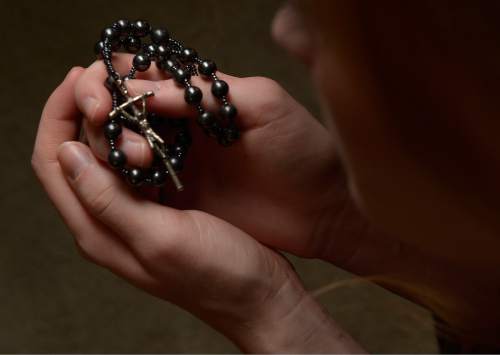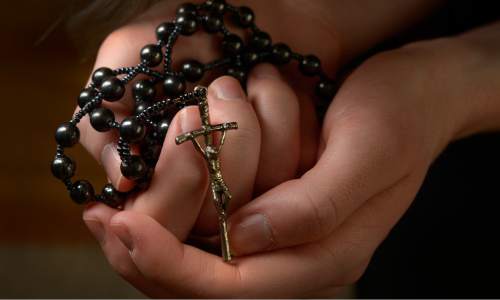This is an archived article that was published on sltrib.com in 2016, and information in the article may be outdated. It is provided only for personal research purposes and may not be reprinted.
Beth lay stunned on her bed, her mind racing back over the dating rules she'd written in her journal just weeks before.
No. 4: No sexual intercourse unless you're officially dating. That's why she'd said no, repeatedly, to the male student now forcing her legs apart after a February 2015 party at her apartment near Utah State University in Logan.
Beth was crushed as the student left her apartment that night — grabbing an apple on his way out the door. He'd stripped her of the ability to make that choice.
Three days later, Beth — a sophomore who asked to be identified by a pseudonym — reported the assault to Logan police, but no charges were filed. She says Logan police told her that because she had consented to oral sex, the case was a long shot and the county lacked the resources to pursue it.
But when Beth took the allegation to Utah State University officials, they had to investigate. And within 60 days, the school determined that the male student "more likely than not" had raped her.
Under Title IX, which bars sex discrimination on campus, every university and college that receives money from the federal government is tasked with investigating and resolving complaints of sexual violence.
But many sexual assault provisions of the Title IX law are guidelines, not mandates, and no two Utah schools handle cases exactly the same.
Students who spoke to The Salt Lake Tribune say they felt a sense of justice when their accusations were sustained by their schools. But getting to that point took too long, they say, and required them to navigate an unfamiliar bureaucracy of top school administrators and complex policies. They struggled to maintain normal college lives as they relived their attacks for groups of strangers, or spent weeks waiting to see action on their cases — fearful all the while that they'd round a corner and bump into their attacker.
Were you or someone you know sexually assaulted while attending a Utah college? Tell The Tribune
And that worry sometimes doesn't end when an accused student is found responsible. Between 2010 and 2015, Utah's public colleges determined that more than 40 students had violated sexual assault policies. Just three students were expelled.
Students dissatisfied with their school's process can file a complaint with the federal government. Westminster College in Salt Lake City has been under investigation since January 2015. In the past month, students at Brigham Young University and the University of Utah have lodged complaints against their schools, saying they did not adequately handle their reported sexual assaults.
The U.S. Department of Education has not said whether it will look into either school. Even if it does, resolution is unlikely to be swift: 190 colleges are currently under federal investigation for their handling of sexual violence, and more schools are added to that list every week.
—
'Almost wasn't worth it'
Beth scanned every face in the library and other public places, looking for her attacker, after her rape in February 2015.
She forged through school assignments, trying to keep her mind occupied with thoughts other than being violated in her own bed.
Logan police took Beth's statement about the rape, but did not interview the accused student after he told officers "he'd spoken to an attorney and would not be meeting with" them, according to the police report. Sgt. Derek Dickey, the officer on the case, told The Tribune that police could not force the accused student to speak with them.
He does not recall any specific conversations with Beth, but says he does talk to victims about what to expect.
When the criminal investigation stalled, Beth was stunned. She typed up, and continually revised, a letter to law enforcement, finding it therapeutic to assemble her thoughts. She never sent it.
Beth found herself grasping for a way to hold the male student accountable. At the prodding of the school's victim advocate, Beth spoke to USU's Affirmative Action/Equal Opportunity Office — which oversees Title IX — in March 2015.
She filed a formal complaint the following month. The office interviewed her, the accused student and witnesses, and gathered evidence, such as text messages.
In the criminal arena, prosecutors have to prove a person's guilt beyond a reasonable doubt. But colleges use a "preponderance of evidence" standard, deciding whether it is more likely than not that a student committed an offense.
Title IX offices investigate cases and typically send their findings to administrators, who decide whether a violation of school policy has occurred. But at Dixie State University, the Title IX office sends its report to a panel of faculty, staff and students.
Sanctions typically are set by school administrators. Students at Weber State University, however, can choose to have a panel decide. And at Brigham Young University, the Honor Code Office determines what discipline to impose if Title IX investigators find that an accused student committed sexual misconduct.
All Utah schools except Westminster College allow students to appeal both the ruling and the penalty. Westminster students cannot appeal sanctions.
Appeals are usually heard by a panel of faculty, administrators and, sometimes, students.
After USU officials found the evidence sufficient to support Beth's rape accusation, she says, the male student appealed both the finding and punishment.
That meant Beth had to recount the graphic details of her rape to two panels, on two separate occasions. At Utah State, the Affirmative Action Advisory Committee evaluates the finding on appeal, and the Student Conduct Hearing Board reviews the punishment. At the time of Beth's hearings, students could sit on the panels. USU has since revised its policy so that only faculty and staff hear sexual misconduct cases.
Beth told her story to one panel over a speaker phone from an empty office — holding her cat tightly in her arms — so she wouldn't have to see her attacker.
But reliving the details of that February night never got easier.
"Has this affected your schoolwork?" a panel member asked.
Of course it has, she thought. It affected every moment.
"The school process almost wasn't worth it because I had to keep going back through all the appeals," Beth says now. "It was just a lot longer and more rehashing than I thought it would be."
In a statement, Utah State said it can't comment on specific cases but added that it "makes every effort to conduct investigations and appeals efficiently and as quickly as possible." The details of each case determine how long it takes to reach a conclusion, the school said.
The U.S. Department of Education recommends, but does not require, that schools complete their initial investigations within 60 days. Documents show Beth's investigation was completed in that time period.
But the feds have no guidelines for how long an appeal should take, simply advising that an "unduly long appeals process may impact whether the school's response was prompt and equitable as required by Title IX."
Utah State said in its statement that officials "first and foremost consider the safety of each student" but that they also take into account "due-process rights of all students, so we look specifically at the details of each case and determine discipline to fit that particular situation."
After about eight months of appeals, Beth says, her perpetrator's punishment was finalized in December: a one-year suspension.
She found his punishment adequate, she says, except for one thing: If he decides to return to campus in January, she won't yet have graduated.
—
Living in limbo
Eighty-five miles away in Salt Lake City, University of Utah student Nisha Kavalam rarely got out of bed in the days following her rape in February 2015, the details of the night looping endlessly in her head.
The Tribune typically does not name sexual assault victims, but Kavalam agreed to be identified.
Reporting to the police, she says, "was an unknown situation." So a few weeks after the attack, Kavalam described the night she was raped by an acquaintance to the U.'s Office of Equal Opportunity and Affirmative Action, which oversees Title IX.
Kavalam was interviewed extensively, she says, as were witnesses and the accused student.
She was devastated, she says, when the U.'s office in April 2015 found there was "insufficient evidence for sexual assault."
She quickly told them she wanted to appeal, but asked that an appeals committee not be convened over the summer because she would be away on an internship.
The school didn't form a panel in fall semester, either — her final months as a U. student.
Those months were agonizing, she says, and she struggled to keep her life on track.
Fear that she would run into her attacker or his friends kept her out of the library. She watched her 3.9 GPA sink as she began to fail three out of five classes.
One day, an unknown number flashed across her cellphone. The voice on the other end of the line said the FBI was going to subpoena her. She panicked, assuming the call was related to her case. It turned out to be a scam.
The case was "seeping its way into every single moment of my life," Kavalam says.
If not for the services she received from the U., she says, "I wouldn't have made it through my last semester."
Most Utah schools provide free, immediate services to sexual assault victims who report to Title IX — access to counseling, deadline extensions for schoolwork and housing changes, for example.
Kavalam says she received excellent counseling through the school's Women's Resource Center. And the dean of students helped delay deadlines and arranged one-on-one meetings with professors, she says, so she wouldn't fall behind as she waited for her day in front of the school's appeals committee.
In the end, nine months passed before the panel was convened. By that time, the case had followed her past graduation and into her career — she had to push back her start date at an Atlanta nonprofit so she could appear before the committee.
The U. reiterated this week that it cannot comment on specific allegations, but has "an obligation to conduct these proceedings in a manner that provides due process for all parties, and that can take some time."
The school says it investigates complaints in an average of 39 days, which does not include appeals.
The U.'s appeals panel, made up of five individuals, including one student, eventually found evidence to support her sexual assault claim, Kavalam says.
But, Kavalam says, her attacker had also graduated by the time the case was finalized.
—
'Quickly as is appropriate'
Mary's face was shoved so deeply into rough, unfamiliar bedsheets she couldn't blink, her naked body pinned beneath a male classmate more than twice her weight.
"Oh my gosh, you are being raped right now," she thought, her arms trapped in the shirt pulled over her head.
Vodka and rum blurred the details of the January 2016 party near Utah State, but Mary knew this was not consensual sex.
Minutes after she burst into her dorm room later that night, hysterically sobbing that she had been raped, her roommate was on the phone with law enforcement.
But Mary — who asked to be identified by a pseudonym — had no intention of pursuing criminal charges. About two months earlier, she says, she'd gone to Logan police to report being sexually assaulted on a first date. The accused student was not charged.
She felt law enforcement failed her in that case and wanted to ensure justice in this one. So she filed a complaint with the university.
The office took Mary's statement about the incident, interviewed witnesses and gathered text messages. But Mary says the investigator gave the accused student a week's notice that officials wanted to speak with him, then waited a month to interview him, content to work around his schedule.
In a statement, Utah State said it gives accused students details about the investigation to provide "an equitable process," but "makes every effort to meet with the accused as quickly as is appropriate."
Title IX officers completed their initial investigation in roughly 60 days, Mary says, but she felt she constantly had to push them to talk to the accused student. They didn't present the investigation as something he needed to prioritize, she says.
"They really didn't put the fear of God in him," Mary says.
Utah State notes that "we take every complaint seriously and dutifully investigate each claim."
Months later, Mary still fiddles with the pepper spray now permanently affixed to her key ring, continually looking over her shoulder for her rapist.
He was found responsible and was suspended from USU for a year, Mary says, but he has appealed both the finding and the punishment.
—
Evaluating changes
Last month, Brigham Young University student Madi Barney filed a complaint with the U.S. Department of Education's Office of Civil Rights, saying BYU blocked her from enrolling in classes after she reported being raped to local police.
Other BYU students have said that the Honor Code Office aggressively investigated them for conduct that came to light when they told the school's Title IX Office about being assaulted.
BYU has said students are never punished for being sexual assault victims. But the school is now considering revising the relationship between its Title IX office and its Honor Code Office, which determines discipline in sexual misconduct cases after receiving findings from Title IX investigators. BYU has formed an advisory panel to examine the process and possibly make recommendations for change.
Last week, The Church of Jesus Christ of Latter-day Saints, which owns the Provo school, issued a statement saying: "There is no tolerance for sexual assault at BYU or in the church. Assault of any kind is a serious criminal offense, and we support its reporting, investigation and prosecution to the full extent of the law."
Kavalam, too, filed a federal complaint, in early May. Her main concern with the U. is the length of its process, which she feels violates the school's federal responsibility to quickly respond to sexual violence. Neither Barney nor Kavalam has heard whether the federal government will investigate her claim.
As of Wednesday, the Department of Education's Office of Civil Rights was investigating 241 sexual violence cases at 190 institutions. Six cases had been added to the list since the previous week.
If a school is found to have violated Title IX, it usually reaches a settlement with the federal government and must show it is making new efforts to comply with the law. A school could lose its federal funding, though experts say that has never happened.
In a statement earlier this month, the Office of Civil Rights said it aims to resolve complaints in 180 days, but it can take longer depending on the case.
Kavalam is eager to learn if the feds will investigate her complaint, but says she feels her message has been amplified already.
"Hopefully the U. heard my desperate cries for change," she says.
U. officials "continue to review and evaluate our procedures to make them more efficient and effective," the school said this week. It has concluded a survey of student attitudes about sexual assault, and expects to have results in the fall that will help shape training programs for students and employees.
The U. is doing a lot of things right, Kavalam says, but they can do better.
"I hope other victims don't have to go through the same thing I did," Kavalam said. "People deserve to feel safe on campus."
Twitter: @anniebknox, @alexdstuckey Were you or someone you know sexually assaulted while attending a Utah college? Tell The Tribune













